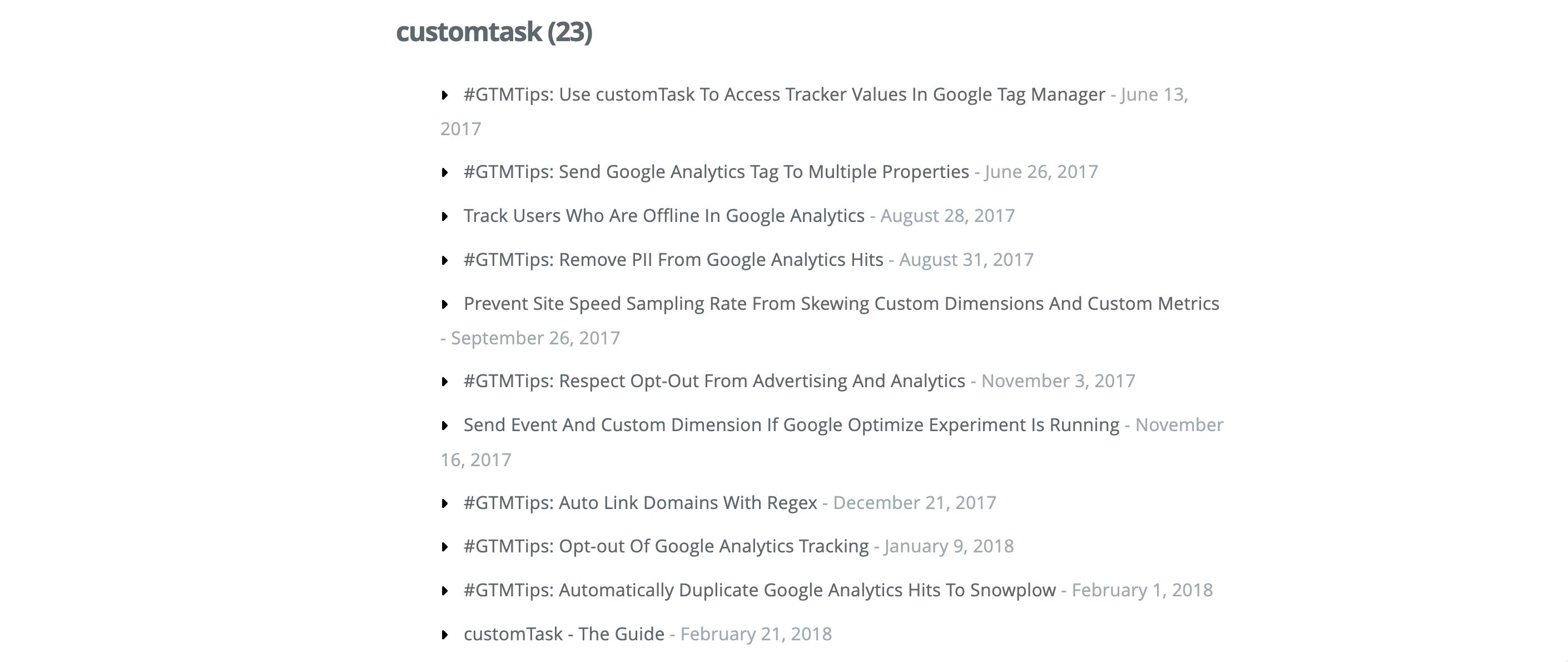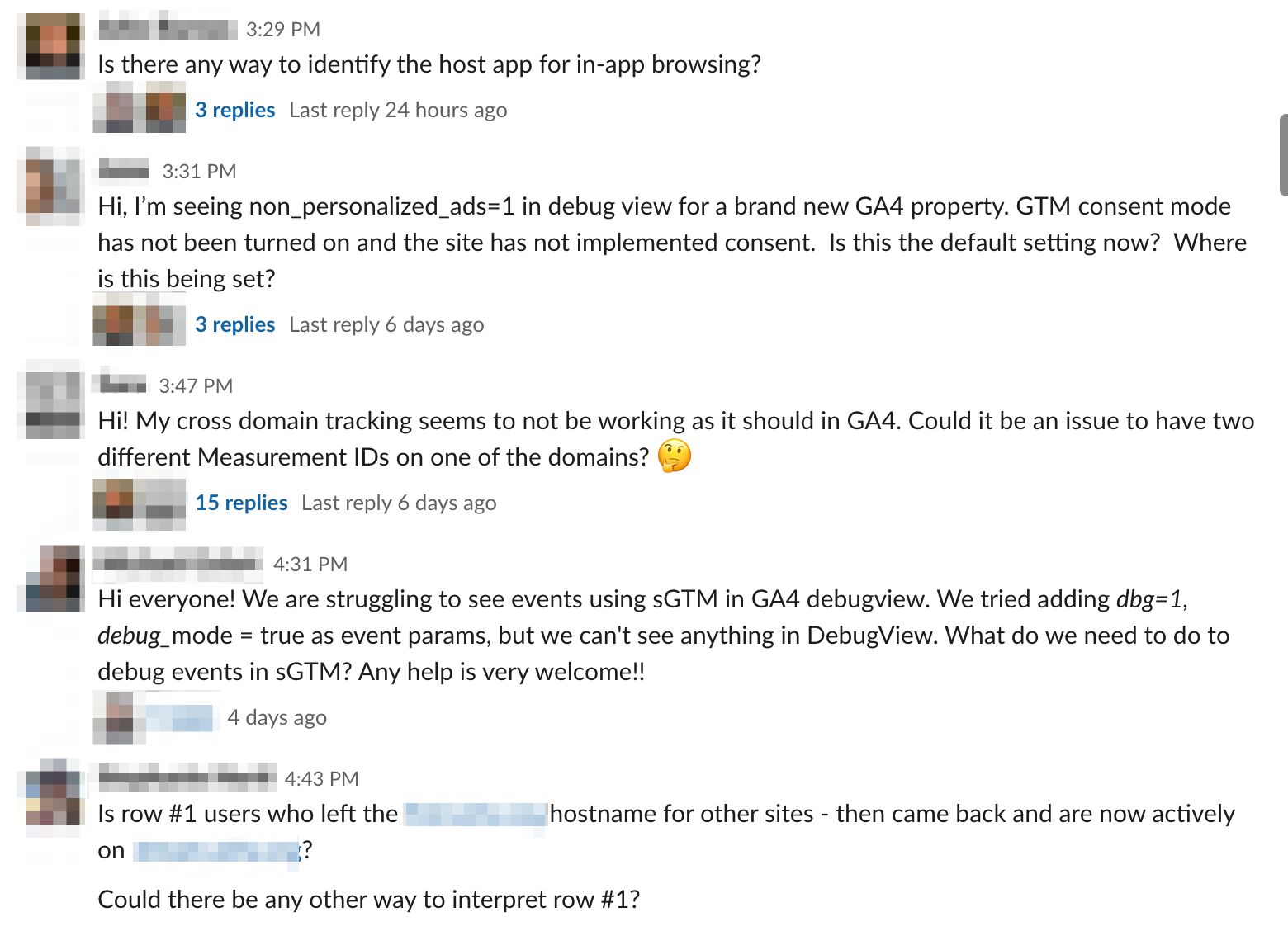I owe my career to Google Analytics.
Whatever success I have achieved over the past 15 years or so can be directly attributed to my work with GA and, by extension, other tools in the Google stack.
Now, Universal Analytics is about to be turned down.
It fills me with a sense of nostalgia and pining for past, simpler times.
When I cast my mind back, a scattering of memories emerges in my mind:
- The incredibly strong and supportive communities we’ve had on Google+, Twitter, Facebook, Measure Slack, and Google’s own support forums.
- Blog post after blog post celebrating new features, hacks, tips, and tricks.
- Google’s Analytics Advocates working together in the community, sharing content and increasing awareness of how Google Analytics is best used.
- A sense of limitless customization facilitated by features such as customTask.
I remember how incredibly inspiring it was to work with Universal Analytics – not because of the platform itself, but because of community.
The community of power users, regular users, Google engineers, and partner agencies, all together in the same boat, trying to figure out the most inventive ways to use Universal Analytics for determining what users do on any given website or app.
Universal Analytics started showing its age the moment it was released. Because it was built on top of the “classic Google Analytics” stack, which dates back to Urchin times, the possibilities of extending and modernizing the tool were limited.
But the advent of custom dimensions, enhanced ecommerce, customTask, and user IDs certainly inspired developers and practitioners to turn Universal Analytics into putty, ready for shaping to fit the idiosyncrasies of each company that deployed it.
Looking back at Universal Analytics on the eve of its final collection ping is doubly bitter-sweet, because what is being proposed as a replacement just doesn’t cut it.
Google Analytics 4 has bugs, cardinality issues, thresholding problems, confusing delineation between client-side and vendor-side processing, a clumsy BigQuery export schema, misleading and gullible advocates, an opaque approach to privacy, and a huge identity problem.
But these are all fixable. These are not the things why I don’t currently consider Google Analytics 4 to be in contention as a serious digital analytics tool for the 2020s.
The main problem is the decline of community, and this is something that Google should take a priority approach with.
If you sample what people are writing about or sharing about Google Analytics 4 in online communities such as LinkedIn or Measure Slack, you’ll notice that most if not all of the posts are about fixes and workarounds.
What little revelation or celebration there is, it’s always focused on making GA4 meet the lowest level of expectation.
Elaborate articles showing how you can create a Landing Page report, or a lengthy blog post on how to hack a custom timestamp to identify individual hits in a batch don’t really advertise the wonders of the platform as perhaps the authors thought they would.
100+ comments on a thread in Measure Slack would normally be an indication of something revelatory or deliciously controversial being shared, but in the case of GA4 it’s mostly practitioners spending countless hours trying to decipher the mechanisms of yet another bug in the tool without any proactive input from Google on what’s actually going on.
GA4 lacks community where Universal Analytics was absolutely teeming with it: a shared sense of wonder and invention.
Google, fix this and you’ll be on your way to fixing Google Analytics 4!
But, remember that community is a joint effort. Thus what follows are my pleas to different stakeholder groups for how to bring community back into focus.
X
The Simmer Newsletter
Subscribe to the Simmer newsletter to get the latest news and content from Simo Ahava into your email inbox!
Dear Google
Make it fun to develop for GA4. Give us client-side controls similar to customTask, so that we can assume governance over the deployment without having to be always guessing what’s being done through the GA4 admin and what’s being done in client-side code.
Stop using your users as guinea pigs. It’s unclear what drives the roadmap of GA4 forward, but it certainly doesn’t seem to be a proactive focus on actually making the tool work better. You’ve left it upon your users to find (and suggest fixes for) bugs that should have been caught at the earliest stages of QA. I think the fact that the community is so eager to help you in this bug hunt has made you complacent and you think it’s OK to delegate QA to the masses of end users. Don’t take their eagerness as a signal that this is an acceptable approach.
Reinstate the Analytics Advocacy team. You have no idea how much they are missed. Remember when illustrious industry legends such as Krista Seiden, Daniel Waisberg, Adam Singer, and Louis Gray used to spread the word of Universal Analytics among thousands upon thousands of audiences around the world? We need that back. We need the advocates to join us where we are, rather than create new communities elsewhere.
Make the Google Analytics Twitter account useful again. You have over a million followers. Start sharing community content again. Stop sharing fatalistic migration threats.
Organize and/or sponsor devfests, hackathons, meet-ups, and user conferences. The Google Analytics User Conference was a great concept – so many practitioners joined together with Googlers to share ideas and content around GA. Let’s bring that back! Be generous in sponsoring smaller events and let those events use your branding in marketing materials. Come to these events and engage with GA users. Make them feel like part of your community again.
Dear agencies and partners
Stop threatening with the migration. No, time is not “running out”. No one should be “worried if you haven’t deployed GA4 yet”. Google Analytics 4 is not a version update. Stop dancing to Google’s fiddle with your claims that it’s the only way forward. Be responsible practitioners and get your clients to re-evaluate their entire stack. If they want to look at other options, help them do so, and don’t try to cajole them into going with GA4 just because it has “Google Analytics” in the name.
Stop pining for feature parity with Universal Analytics. Firebase Analytics was a good product analytics tool. When it morphed into Google Analytics: App + Web and later into Google Analytics 4, it lost its identity. Is it for product analysts? Is it for marketing analysts? Is it even for analysts or just for building dashboards and reports? Who knows? I don’t think anyone has a handle on what Google Analytics 4 actually is, but the more its unique qualities are being diluted with the onslaught of features from the soon-to-be-deprecated feature set of Universal Analytics, the more difficult it is to carve a niche among more modern analytics tools.
Dear power users
Consider server-side tagging to satisfy your customization needs. Since there’s so little we can do client-side with Google Analytics 4, it feels like server-side tagging is the way to scratch that customization itch. Much of the control ingrained in features like customTask is now achievable through the server-side proxy, and it seems like Google is really pushing server-side tagging as a (rightly) viable way of asserting control over the GA4 data flow.
Be more ambitious with your content. Let’s try to figure out how to build content around GA4 that celebrates invention rather than bug fixes. There’s a lot of stuff going on in the server-side tagging space and with the Google BigQuery export, but it seems like there aren’t many a-ha moments emerging from GA4 use itself. Explorations have a lot of potential to engender innovation, but crippling UI bugs and data inconsistencies are standing in the way. Still, it would be cool to have a resurgence of content around all the “cool” stuff you can do with Google Analytics, even if the tool itself is currently making it difficult to innovate.
Dear end users
Remember that Google Analytics 4 is not the only option you have to replace Universal Analytics. As it turns out, there are lots of analytics tools out there. With Universal Analytics being deprecated and no way of actually migrating your analytics data to GA4, it seems like right now is the best time ever to shop around. You must do this. Be responsible – don’t waste countless hours in trying to make GA4 work for your organization, when there might be a more suitable tool just around the corner. Force your analytics vendors, suppliers, and partners to show you the selection out there. If they aren’t up to the task, start making some calls.
Don’t be satisfied with mediocrity. Demand more of Google Analytics. Stop doing free quality assurance for Google, and instead make it clear that the major bugs you come across should never have emerged in a public release in the first place.
Don’t let absurd limitations bully you into submission. Each time someone suggests limiting data collection to avoid cardinality issues something inside me dies. What an absolutely terrible, irredeemable, unforgivable way to approach measurement planning! Who in their right mind thinks it’s a viable approach to limit the range of values you can collect in any given dimension just because the platform you’ve decided to use places an arbitrary limit on the reporting output? Let’s not forget that cardinality does not impact Explorations or the BigQuery export, and that there are other tools than Google Analytics 4 out there that do not have such limitations.
Dear all
Google Analytics 4 can be an extremely good tool in the digital analytics genre. Let’s just not pretend it’s there yet.
Let’s reinvent the Google Analytics community, so that we can work together to make the best of the entire Google marketing stack.



